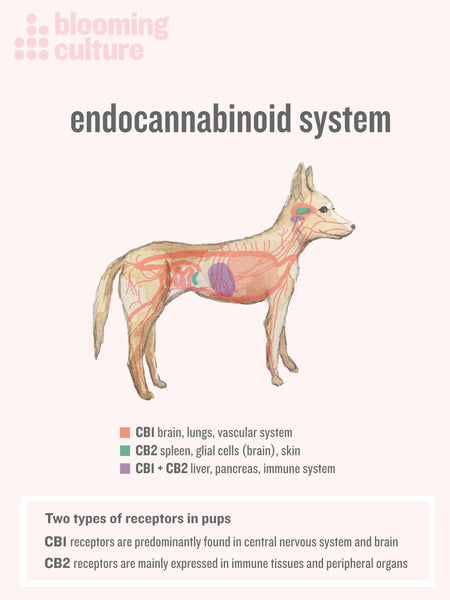
CBD interacts with receptors/activators TRPV1, 5-HT1A, & GPR55 which regulate mood, sleep, pain, memory, appetite, inflammation, nausea, and stress levels. In canines specifically, CBD loosely binds itself to the
Cannabidiol (CBD) is a compound found in cannabis plants. Unlike THC, another well-known compound from the same plant, CBD does not produce any psychoactive effects. This makes it an attractive option for therapeutic use in humans and animals alike, without the risk of a "high."
Both humans and animals have an endocannabinoid system (ECS), which plays a crucial role in maintaining the body's balance. CBD interacts with the ECS, potentially offering therapeutic benefits such as pain relief, anxiety reduction, and more. This interaction is fundamental to understanding how CBD can benefit pets.
Research suggests that CBD can help manage anxiety, reduce pain, and even improve skin conditions in dogs. It works by interacting with the ECS to help maintain balance in these areas.
CBD Effects on Cats
Similar to dogs, cats may also benefit from CBD. Potential benefits include anxiety relief, pain management, and even help with certain digestive issues. However, cats may be more sensitive to CBD, so it's crucial to start with a lower dose and closely monitor their response.
While the fundamental effects of CBD on cats and dogs are similar due to their shared ECS, differences in metabolism, size, and sensitivities mean that dosages and responses can vary. It's essential to use pet-specific CBD products and start with the manufacturer's recommended dose, adjusting as necessary based on your pet's reaction.
The primary difference between CBD use in humans and pets lies in the dosage and possible additives. Human CBD products may contain ingredients that are harmful to pets, so always check the label.
CBD offers a promising natural remedy for various conditions in pets, with growing research supporting its use. By understanding how CBD works and following guidelines for safe use, pet owners can potentially improve their pets' quality of life.
*Always consult with a veterinarian before introducing CBD into your pet's routine.

CBD interacts with receptors/activators TRPV1, 5-HT1A, & GPR55 which regulate mood, sleep, pain, memory, appetite, inflammation, nausea, and stress levels. In canines specifically, CBD loosely binds itself to the